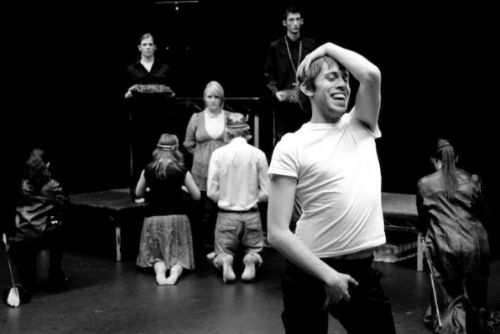
December 6, 2007, by Peter Kirwan
Edward II (CAPITAL) @ The CAPITAL Centre
With all the interest in Shakespeare’s history plays at the moment, it is perhaps surprising that Marlowe’s precursor to the cycles, Edward II, hasn’t received more attention. Julia Ihnatowicz’s new production for the CAPITAL Centre, redresses this, visually echoing the RSC’s Histories Cycle to create an effective prologue that draws clear links with Shakespeare’s works while still giving the play a distinctive voice and feel of his own.
This production gave a clear and straightforward reading of the text, uncluttered by unnecessary frills, with solid performances across the board and a fast pace. Aside from the stylised battle sequences and the evocative (if occasionally overpowering) improvised jazz score, Ihnatowicz allowed the performances to speak for themselves. The intimate environment of the CAPITAL studio added to this, often placing the audience only inches from the action, and so allowed the cast the opportunity to engage fully with the audience and each other, their energy filling the space.
The first half of the play was dominated by David Ross’ Gaveston in an unashamedly and unambiguously gay reading of the character that saw he and Matthew Goad’s Edward kissing openly in front of the embarrassed courtiers. A truly unpleasant piece of work, sneering at the other courtiers, mocking the peasants who sued to him and using sulkiness as a form of emotional blackmail against Edward when faced with banishment, he yet never became entirely unlikable. His direct addresses and irrepressible energy made him a very watchable villain, and his brutal castration and murder at the hands of the nobles turned him into a victim, even if he was to blame for his own downfall.
His camp brand of nastiness was countered by the colder and more scheming courtiers, led by Alex Knight’s Mortimer, Luisa Dorileo’s Lancaster and Sam Sedgman’s Warwick. What began as justifiable unease at the favour shown to Gaveston became quickly darker, as the nobles grew in confidence and started making more demands, until it became clear that rebellion was enough of a cause in its own sake. The pleasure that they took in closing ranks on Gaveston in front of the King, in dismembering him (and, in Lancaster’s case, stepping on his bloodied crotch with a deliciously vindictive smile) and in finally brandishing swords against their king was unjustifiable, and the purge of the rebels became Edward’s only real option.

Alex Knight’s Mortimer and Anna Henderson’s Queen Isabella carried the rebellion into the second half of the play. The progression of both characters was interesting, particularly in the light of Shakespeare’s plays. Mortimer parallelled Young Clifford of the Henry VI trilogy, starting the play noble but corruptible and ending it as the evil tyrant kicking away the young prince he was meant to be protecting. Isabella, meanwhile, started as the spurned queen reminiscent of Richard II’s wife, but quickly turned into Margaret of Henry VI and revelled in her free sexuality and the bloody deeds done in her name. It was Isabella who was left sprawled on the floor sobbing as the play ended with Edward III taking control over his own destiny.
The modern dress (nobles in leather coats and murderers in jeans) and slow-motion fight scenes, with the two armies snarling at each other, evoked the RSC’s history plays and were effective in the small space, hinting at the scale of these events. The action sequences were also very effectively handled: a quick turn saw the nobles overcome in the final battle, the castration was surprisingly realistic and fluid and the famous moment with the poker had the audience collectively wincing.

Comedy was provided in a memorable performance from Simon Nussbaum as Lightborn, tutting in feigned pity as Edward crawled across the prison floor to his death bed. The highlight of the performance, though, was Genevieve Raghu’s inspired Prince Edward. Using her small stature to great effect, Raghu darted among the other actors- pulling at a cloak here, clambering onto staging there, all the time giving the impression of a child let loose into a place they really shouldn’t be. In one wonderful scene, King Edward and Isabella negotiated their relationship while the young prince forced himself between them, putting their hands together and smiling happily as he created a reunion between his parents. Both funny and moving, Edward’s journey towards adulthood in the second half was also powerful, particularly as he tried to prevent Mortimer ordering the death of his uncle (Briony Rawle’s solid Edmund) from death and was kicked away for his pains.

The company worked well as an ensemble, and it was interesting to see the title character take a relative back seat to the rest of the story. Matthew Goad’s performance as the King brought out the monarch’s ineffectiveness and political impotence, allowing events to happen to him and offering little more than ranting to back himself up. His performance came out most strongly in his second half speeches as he prepared to resign the crown, evoking the famous speeches of Richard II and bringing out the character’s internal conflicts.
An all-round success, the play certainly demonstrated to me the accessibility of Marlowe in performance, and above all it was the clarity of the production that proved its strength. The music (including some fantastic singing) added to the atmosphere, and the cast maintained a consistently high standard throughout. I only hope I get the chance to catch some more Marlowe in the near future.
Photographs for this review provided by Ashmore Visuals .

Two different spellings in the first two paragraphs? I know Polish names can be tricksy but surely once you’ve got it right you should be able to keep it right…
Trains permitting, I should be seeing this tomorrow.
Grr, well, it’s a stupid name anyway…..
How are you, Nitesh?
I’m very well Mr Kirkwin, thank you for asking.